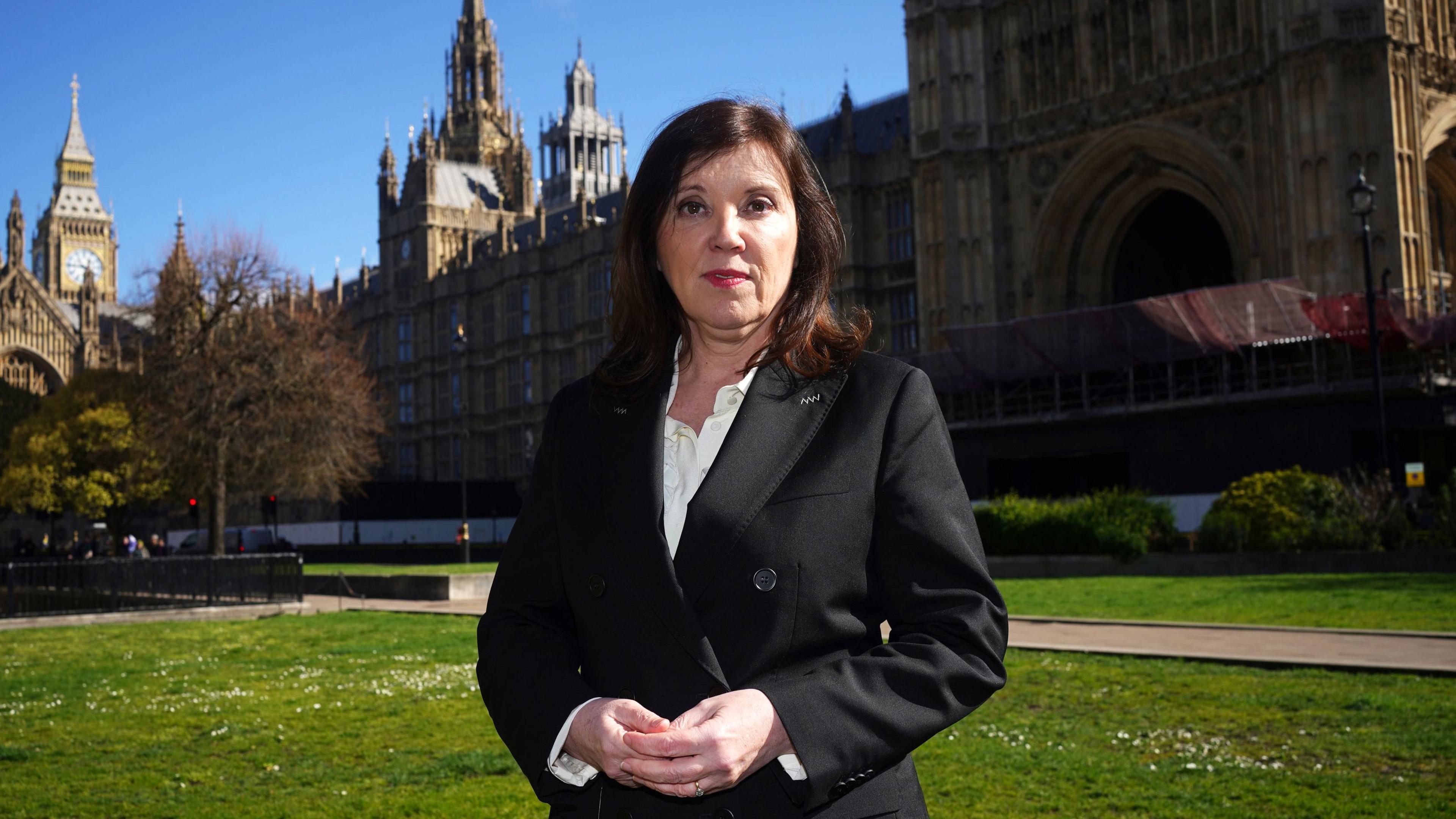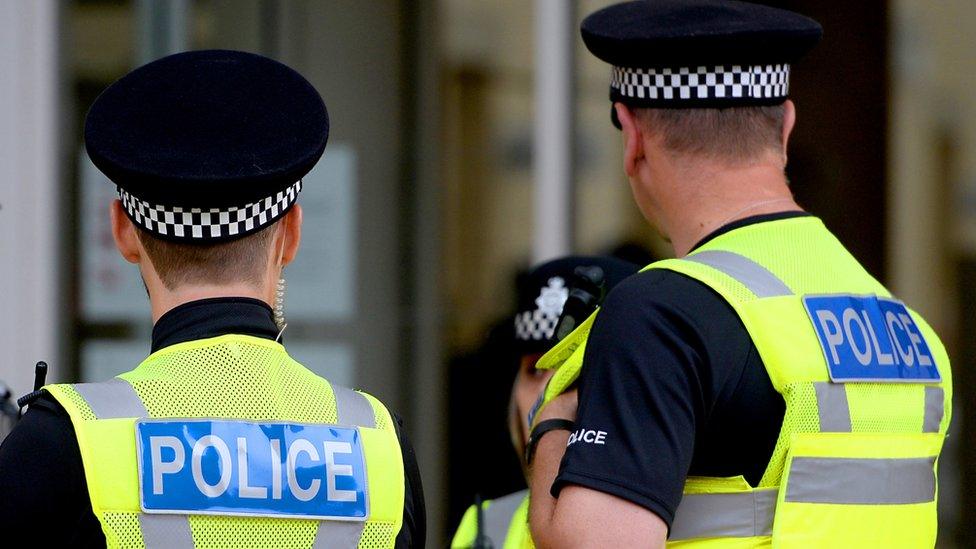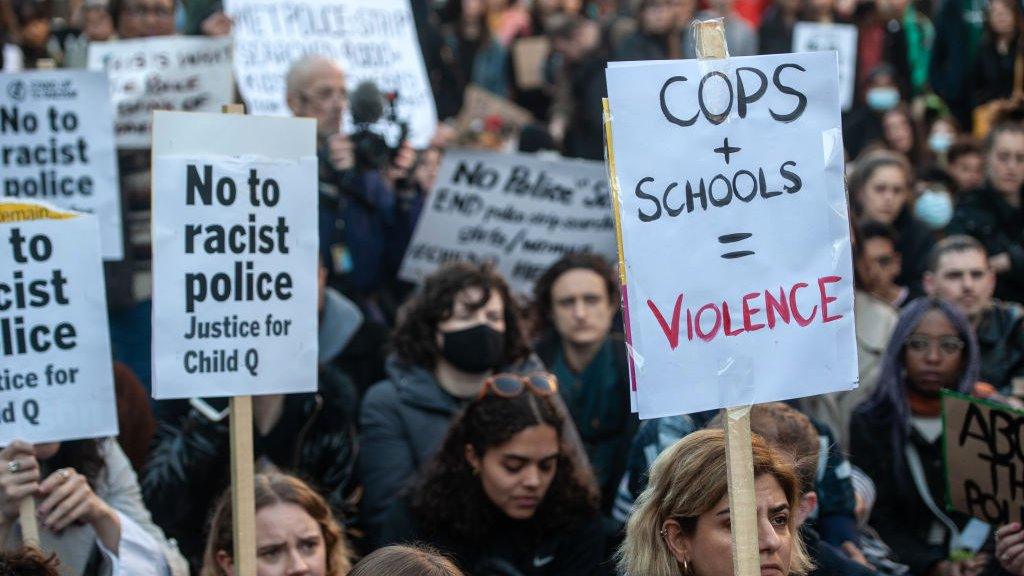One in 20 child strip-searches 'didn't follow rules'

Dame Rachel de Souza, children's commissioner for England, says her office will publish data annually until strip-search figures come down
- Published
Too many strip-searches of children in England and Wales are "unnecessary, unsafe and under-reported," a new report warns.
Data gathered by Children's Commissioner Dame Rachel de Souza shows that, from 2018 to mid-2023, police conducted more than 3,300 child strip-searches.
One in 20 did not comply with strict rules, including the need to have an appropriate adult present, the report found. It was also concluded that black children were more likely to be searched.
A Home Office spokesperson said: "No child should ever be strip-searched without an appropriate adult, unless there is a risk of serious harm to themselves or others, nor should they ever be conducted on the basis of their race and ethnicity."
'Not a one-off'
Police in England and Wales can carry out strip-searches - which involve the removal of someone's clothes - if guidelines are followed under stop-and-search powers or in custody.
Officers have to ensure they act in a sensitive, proportionate way and an appropriate adult must be present.
"My argument is, they should only be done if it's a life-threatening situation," Dame Rachel told BBC Breakfast.
She added there should always be an "appropriate adult there" but that, between July 2022 and June 2023, "in 45% of cases, there are not".
The report, which Dame Rachel said includes some previously unseen data, is part of a series commissioned following the high-profile case of Child Q - a 15-year-old schoolgirl strip-searched in 2020, at her school in Hackney, east London, having been wrongly accused of possessing cannabis.
It prompted outrage when it emerged in 2022 and Dame Rachel told Radio 4's Today programme that she was told at the time "this was a one-off, so I used my data powers to find out whether that indeed was a one-off, and it was not".
The commissioner said her office would continue to publish data "every year, and will not stop until both the numbers of inappropriate strip-searches come down".
The key findings:
More than 3,300 strip-searches of children were conducted by 44 police forces* in England and Wales between January 2018 and June 2023
A child was strip-searched every 14 hours under police stop and search powers
One in 20 strip-searches were not compliant with statutory codes of practice
Between July 2022 and June 2023, 47% of searches resulted in 'no further action’
*Includes the British Transport Police
Her report does show some improvements, with a lower number of overall strip-searches - 42% fewer in 2022 than in 2020 - and better safeguarding referrals.
There was also a fall in the number of strip-searches on black children in the same period, but they were still four times more likely to be strip-searched than the overall child population.
Dame Rachel told BBC Breakfast that police "have a big job to do here in terms of listening to young people, especially those that are from the black community and other communities, that are disproportionately in these figures".
She said there are "groups of young people" who feel they are "picked on - and unfortunately, data like this shows that it does look like this is the case".
'Left naked in the cell'
I met a mother who says her 14-year-old son was strip-searched while in custody in the south of England without an appropriate adult present.
He was arrested on suspicion of possessing cannabis but claims it was a small amount for personal use.
"He was strip-searched and then left naked in the cell," the boy's mother said.
He was diagnosed with autism in primary school and now, in his twenties, is living with psychosis, schizophrenia and bipolar disorder.
His mother says his mental health has been severely damaged by multiple stop and searches during his childhood and has accused police of targeting him because of his black ethnic heritage.
"The police brutality that he's experienced, it's not something that professionals want to talk about and address with him."
"One of the issues that we have is that where he's been brought up in predominantly white environments, he minimises a lot of the racism that happens to him."
Elaine Isadora Thomas is the Founder and CEO of The Mentoring Lab, a youth organisation in Hackney, which supports young people, parents and community groups from marginalised backgrounds.
"This report is damning. It damages what we expect from police and the police service," she said.
"If we're strip-searching young people, and it's disproportionately against young people who are from African and Caribbean backgrounds, then we're not looking at the root causes.
"If we take a no strip-search approach, then we have to look at other options."
The Home Office said the government has committed to introducing new safeguards for strip-searching children and young people in its manifesto and would carefully consider the Children's Commissioner’s recommendations to ensure police can keep people safe in a fair and proportionate way, with full regard for a child's dignity.
The National Police Chiefs’ Council (NPCC), which brings together leaders from forces across the country, says it's working with the Home Office, the College of Policing, and others to make changes to the codes of practice governing strip-searches.
Assistant Chief Constable Andrew Mariner, the NPCC's lead for stop and search, said he agreed with the report's findings and that the group would be "refining existing training for officers that explicitly teach the trauma that these types of searches can have on individuals and communities".
Related topics
- Published19 March 2024

- Published27 March 2023
